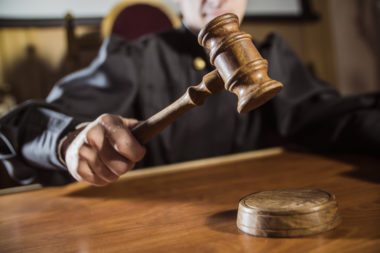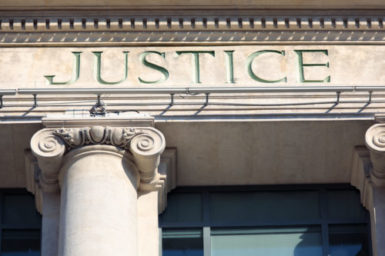Justice and Righteous Courts are Foundations of Peace
by Dr. Michael Schulman, Executive Director of Ask Noah International
Delivered as a talk at the 4th International Noahide Conference, Jerusalem, Israel, 5779 / 20’19 [1]
Why is it so important to understand the Noahide commandment for Laws and Courts?

If society is to function successfully, it must impose upon itself a legal structure to ensure adherence to core values. Peace and success among the members of a society can only be fostered if a righteous moral code is used to establish enforceable boundaries of behavior. Every nation, state or province, and municipality is obligated to have a system of courts to uphold the Noahide Commandments. Beyond this, all societies must also establish civil laws according to righteous principles. Their courts must rule justly on civil matters, since these inevitably arise in daily life.
For the good of the society, courts or governments may place necessary legal limits on activities that the basic Torah commandments do not address. This applies as long as the restrictions are acceptable to the population in general. Then, by the Noahide “Law of Courts,” citizens are required to observe the secular law. The courts can apply any non-capital punishment that the public in general accepts for those matters, as long as it is not cruel or unusual. This is called “going beyond the letter” of the Torah Law. It is a common concept in Jewish observance, and it applies to Gentiles as well.
On the other hand, even in the Torah Laws, there are built-in limitations and restrictions on when and how some of them can be applied. For example, in the Torah Law for Jews, there are many sins that make a Jew liable to capital punishment. However, the conditions for when that punishment can be applied are restricted to trials that are conducted by a valid Jewish Sanhedrin court. An actual Sanhedrin only exists at a time when the Holy Temple is built and functioning in Jerusalem.
We still face accusations from people who are largely ignorant about the details and application of the Noahide Code, who don’t want to learn it correctly and who would rather speak slander against a righteous movement that calls into question their anti-Torah dogmas. Therefore, it’s very important for Noahides to know what to answer regarding those challenges. Based on what I’ve seen, the most important one revolves around the Noahide commandment to establish laws and courts, and when and how it applies.
The Rabbinical authorities of our generation have taught that the Torah Laws concerning an obligation for Noahide Courts to administer capital punishment apply only if the majority of the society’s population (1) believes in the One True G-d and (2) specifically observes the Seven Noahide Laws as Divine commandments that they accept upon themselves. In that situation only, an individual who leaves the behavioral boundaries of the society to transgress one of those specific commandments would liable to the specified punishment from a governmentally-empowered Noahide Court.
In many countries, the majority of the population does not believe in the One True G-d or does not accept one or more of the Noahide Commandments. (As a whole, they regularly permit transgression of at least one of these commandments.) The courts of those societies are not permitted to sentence a transgressor of one of the Seven Laws to receive capital punishment.
Why is this the case? If Gentile witnesses and judges do not accept and observe any of the Seven Noahide Laws, due to this being the case for society at large, then they are nevertheless forbidden to convict someone as liable for the death penalty. This applies even if they are considered trustworthy by society and do generally observe law and order.
These witnesses and judges do not accept the “yoke of Heaven” and their Divine commandments. Therefore, the trials they conduct do not fulfill the conditions for an actual Noahide Court. Among Gentiles, only an actual Noahide Court is is permitted by G-d to fully apply the Torah Law in regard to His specified punishment for transgressing a Noahide Commandment.
There is one exception to this rule
There is one exception on a practical basis. If the secular courts decide that it is necessary to apply capital punishment for murder, they are permitted – but not required within Torah Law – to execute convicted murderers. This serves as a deterrent and strengthens the safety of the society
Rav Moshe Feinstein o.b.m., was a main authority in Torah Law after World War I. He ruled that the non-Noahide Gentile courts in our modern secular societies may not impose a death penalty, even for homicide, unless they see that extenuating circumstances are forcing them to do so specifically for murderers. This may happen if the society becomes unchecked in transgressing the basic prohibition of murder.
Partial fulfillment of the commandment for Laws and Courts is an important accomplishment
Even if most of the Gentiles in a country do not abide by the Noahide Commandments as Divine precepts, it’s usual that they observe the basic obligations of some of those commandments based on their own morality and logic. Then their legal system is considered for them as a partial fulfillment of their commandment of Dinim – the obligation to establish laws and courts. This applies if they abide by the prohibitions of theft and murder, and judge transgressors in an upright manner by establishing courts to sentence transgressors. They must judge cases of theft, murder, bodily injury and the like, and decide in monetary cases.
In our time, the courts in such societies usually sentence violators of the Noahide Commandments only to confinement in jail or other punishments. Such courts are nevertheless keeping the society from reverting to chaos. The main principle and purpose of the commandment of Dinim is to establish a settled society that protects its citizens from being wronged by one another.
Unfortunately, there are many misinformed critics of the Noahide movement. Therefore, it’s important to know this response – that there is no obligation or permission for Noahides to set up their own Noahide Courts if they are a minority in a country. This certainly applies if it is a generally just society.
But what about Noahides who have the opportunity to participate in their society’s secular legal system? Is that allowed? An observant Noahide who has the ability and knowledge to judge is permitted and has a duty to become a judge for a non-Noahide Gentile court. This is in order to establish law and order in the society as much as possible.
It applies even if (due to the circumstances in his country) he is unable to administer justice by the guidelines of the Noahide Code. Likewise, an observant Noahide who is able to give testimony on a certain matter, or has reason for a lawsuit against another person, must go to the secular courts and testify or bring the case before them. Why? It’s because those judges are bringing a degree of righteousness and morality to the society.
But if it is clear that the justice system of the country is corrupt, it is forbidden for a person to participate in such judgments, either as a judge, witness, or litigant.

Appointment of judges and law-enforcement officers
A government is obligated to appoint worthy judges and officers to faithfully enforce the laws and settle legal disputes. Sometimes a strong-willed person without knowledge, qualifications and temperament to judge, rises up on his own and starts forcing his opinions and decisions on other people. That does not fulfill the commandment for judgments. Instead, it can lead to theft, murder, corruption and either societal chaos or brutal dictatorship.
Those kinds of conditions are in direct opposition to Isaiah 45:18 – “Thus says G-d, Creator of the heavens: [the verse digresses and explains, who is G-d?] He is the G-d, the One Who fashioned the earth and its Maker; He established it, He did not create it for chaos, He fashioned it to be settled: [and now the verse goes on tell that G-d says,] I am G-d and there is no other.” So we see that G-d associates His Own Self, and His purpose in making the universe, with the goal that there should be settled societies of human beings filling this world. This Divine goal is not achieved without smoothly functioning systems of fair and justice in every society. Obviously, the justice administered needs to be in accordance with G-d’s will.
The Noahide Code does not specify in detail all the standards of justice and judging that Gentile courts must abide by. Instead, G-d’s standards for Jewish courts and judges are specified in the Torah in great detail. The aspects of those standards that are logically necessary are also obligatory for the Gentile courts. Societies in the last few centuries have thrown off absolute monarchs and dictatorships, and established free societies. Almost all of those societies looked to the Hebrew Bible for guidance in setting standards of justice for their courts.
This especially applies to the process of appointing judges. Citizens who live in democratic societies usually have some responsibility for the appointment of judges. In some countries, the judges at some levels are elected by the people. In other countries, the people elect government officials or ruling parties that appoint the judges. Therefore, it is extremely important to seek the election or appointment of judges who uphold Torah-based values. They should lean closer than most of the other judges to upholding the precepts and principles of the Noahide Code. Those conservative judges may be the last line of defense against total takeover of the government by radical factions.
Nevertheless, we must remember that conservative values are not the only thing that we need to look for in our judges. The Torah tradition demands considerably higher than average standards for judges. This is in line with Deut. 16:20, “Justice, justice you shall pursue!” In the words of the sage Rabban Shimon ben Gamliel in Ethics of the Fathers 1:18, “The world endures by virtue of three things – justice, truth and peace, as it is stated [Zechariah 8:16], “Administer truth and the judgment of peace in your gates.”

Some qualifications that are needed for judges and those who appoint them
From Part VIII of the book Sheva Mitzvot Hashem by Rabbi Moshe Weiner,
- Only worthy judges should be appointed or elected.
- The judges and those who appoint them should be familiar with the judicial system. They should have good character traits, and should not be greedy for money.
- The officials who appoint judges should not to show favoritism. Judges should not be chosen based on things that have no objective relevance to the qualifications for judging.
- Every judge needs to have seven good qualities: wisdom; humility; fear of Heaven; disdain for money; love of truth; being accepted and highly regarded by people in general; and a good reputation, without involvement in forbidden or immoral activities.
There is also a direct requirement upon the citizens to honor and respect the people who have been installed as the official judges. This is part of the obligation of establishing a judicial system. It applies even for judges who have only a few of the ideal qualities. But if a judge turns out to be completely unworthy of judging, it is an obligation to correct this by removing him from his position. For example, a judge who takes a bribe or intentionally perverts judgment should be removed from his judgeship and put on trial for committing those transgressions.
Conditions for judging and testifying in Noahide or Non-Noahide courts
What does the Torah say about the conditions on judges and witnesses in cases of violating the basic Seven Noahide Laws? Those are the most serious transgressions. In the Divine law of judging a murderer that G-d told to Noah (Genesis 9:5), it says, “But your blood of your souls I will demand… and from the hand of man, from the hand of each man, his brother, I will demand the soul of man.” The Sages explained the meaning of this instruction as follows:
– “your blood of your souls I [G-d] will demand” refers specifically to a case with liability for a capital sin.
– “his brother” means that a relative of the accused person is permitted to serve as a judge or a witness. But if the relative has a personal connection to the case, or if he has great love or hatred for the defendant, then he is invalid to be the judge. If the testimony from a relative will be for that witness’ own benefit, he is an invalid witness for that case.
– A man is not allowed to testify against himself that he transgressed one of the Noahide Laws. He is also not allowed to testify against his wife, since a wife is considered to be one with her husband.
– The words, “from the hand of [a] man” in this verse mean that the trial in capital cases should only be with judges or witnesses who are men. Also, it is sufficient to have only one judge and/or one reliable witness, but he needs to be an eye-witness. [In Torah Law, if there is only one eye-witness instead of at least two, that is called “circumstantial evidence”.]
All functional societies make laws for themselves beyond the basic Seven Noahide Laws. For those types of cases, if some rules of the courts may be decided by the judges, they are permitted to accept a person’s testimony according to their decision. This applies even if the person can’t serve as a witness under the basic Noahide Law. For example, Gentile women are allowed to arbitrate or serve as witnesses in monetary cases involving Gentiles. Or, the judge can choose to decide a case based on his assessment of non-eyewitness evidence. Alternatively, the judge can be stricter than required and only judge based on the testimony of two eye-witnesses.
There is a main difference between the rules for Noahide Courts and the rules for court systems in countries like the USA. Torah law does not consider a jury of non-judges to be a valid court for judging or deciding a punishment in any case involving transgression of a Noahide Law. Why did the American colonists who founded the USA institute the condition of trial by a jury of one’s peers? They wanted to have a safeguard against the judicial bias that they had suffered under the oppressive rule of the king of England.
The obligation to have law-enforcement officers
Included in the commandment to set up courts of law is that every court must have officers who will enforce the laws and judgments. Officers who do this righteously are actively involved in observance of this commandment.[2] One role of the officers is to force the litigants in a court case to follow the decision that the judge will decide. They must also do the following:
- summon litigants to come to court,
- patrol the city and marketplaces,
- supervise the business transactions so that there will not be fraud or theft,
- check the merchants’ measures and weights, which must be accurate,
- fix any wrongdoing that they see, or bring the matter before a court of law to judge it,
- and arrest any criminal and bring him to court.
All of the officers’ activities should be performed only in accordance with the instructions from the court. They are not allowed to exercise their authority based on their own opinion. Especially, just as the public must respect its judges, so too they must respect the officers. The courts should be given permission to punish someone who humiliates a law-enforcement officer.

The obligation for “settling the world”
G-d’s known standards for moral human behavior are part of His desire for “yishuv olom” (literally, “settling the world”). This is a Biblical term that refers to the Divine obligation for people to make societies that are peaceful and proper in G-d’s eyes. Therefore, establishing righteous laws and courts also falls under the Noahide obligation to promote yishuv olom. As well, people should be encouraged to act in ways that are morally proper according to G-d. At the minimum, they should at least refrain from acting in ways that are known from the Hebrew Bible to be abhorrent to G-d. This applies whether or not the undesirable actions are actually liable to punishment according to the Torah’s Noahide Code.[3]
Footnotes
[1] This talk is based on the Torah laws for Gentiles in Part VIII of the books Sheva Mitzvot HaShem (2nd edition, in Hebrew) and The Divine Code (4th edition, in English), by Rabbi Moshe Weiner of Jerusalem.
[2] See the book Spiritual Survival for Law Enforcement.
[3] For example, a society ‘s legal system has the right to limit male citizens to only one legally contracted wife at a time, if this is judged to be a benefit for the society. (This includes both formally registered marriages and common-law marriages.)








